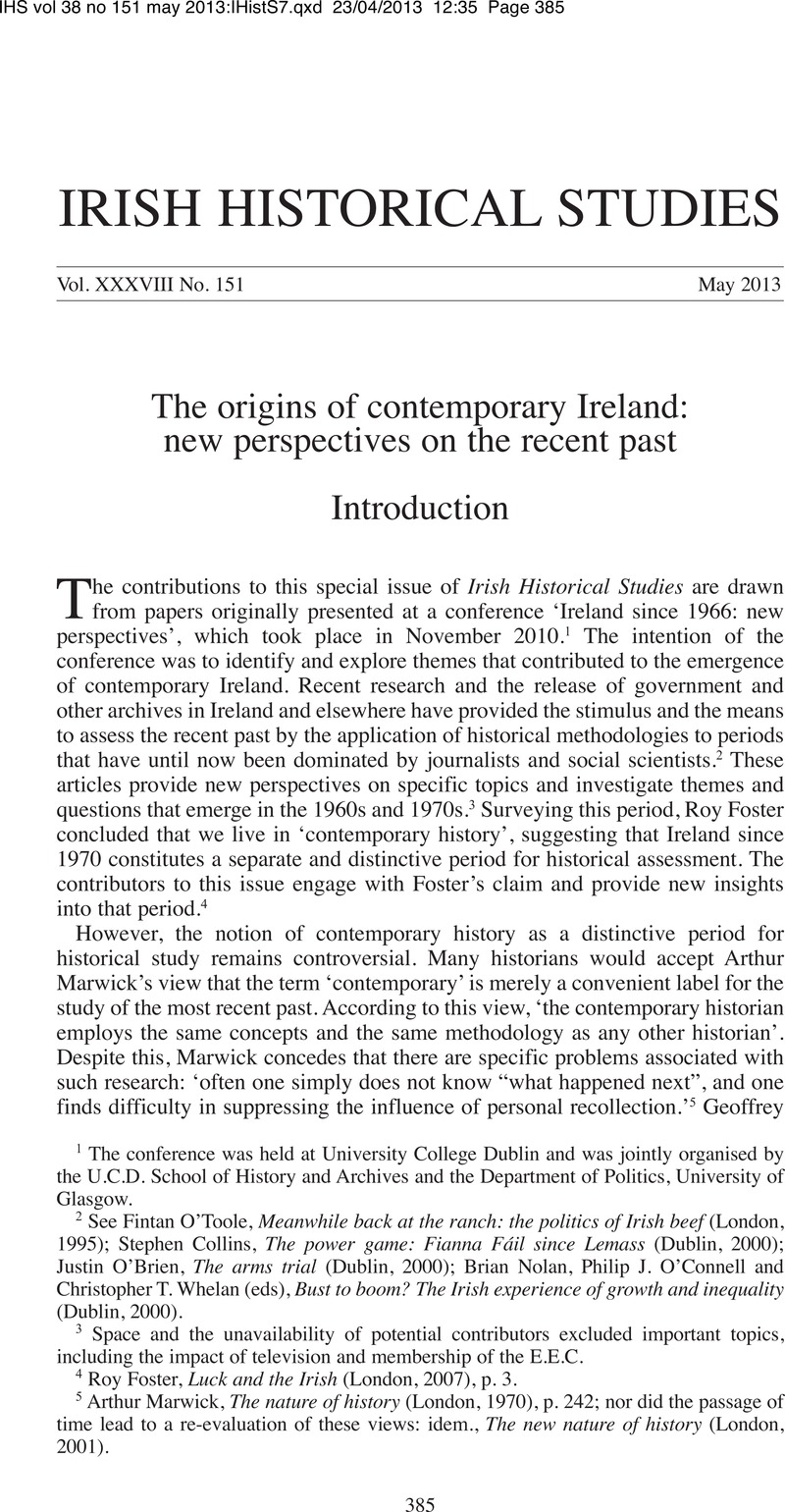No CrossRef data available.
Published online by Cambridge University Press: 04 February 2015

1 The conference was held at University College Dublin and was jointly organised by the U.C.D. School of History and Archives and the Department of Politics, University of Glasgow.
2 See O’Toole, Fintan, Meanwhile back at the ranch: the politics of Irish beef (London, 1995);Google ScholarCollins, Stephen, The power game: Fianna Fáil since Lemass (Dublin, 2000);Google ScholarO’Brien, Justin, The arms trial (Dublin, 2000);Google ScholarNolan, Brian, O’Connell, Philip J. and Whelan, Christopher T. (eds), Bust to boom? The Irish experience of growth and inequality (Dublin, 2000).Google Scholar
3 Space and the unavailability of potential contributors excluded important topics, including the impact of television and membership of the E.E.C.
4 Foster, Roy, Luck and the Irish (London, 2007), p. 3.Google Scholar
5 Marwick, Arthur, The nature of history (London, 1970), p. 242;Google Scholar nor did the passage of time lead to a re-evaluation of these views: idem., The new nature of history (London, 2001).
6 Barraclough, Geoffrey, An introduction to contemporary history (Harmondsworth, 1967; original edn, 1964), pp 1–20.Google Scholar
7 Catterall, Peter, ‘What (if anything) is distinctive about contemporary history?” in Journal of Contemporary History, 32, no. 4 (Oct. 1997), pp 441–52;Google ScholarBrivati, Brian, Buxton, Julia and Seldon, Anthony (eds), The contemporary history handbook (Manchester, 1996).Google Scholar
8 Spohr Readman, Kristina, ‘Contemporary history in Europe: from mastering national pasts to the future of writing the world’ in Journal of Contemporary History, 46, no. 3 (July 2011), pp 506–30.CrossRefGoogle Scholar
9 Barraclough, Introduction, p. 12.
10 Hachey, T.E., ‘Introduction’ in Hachey, T.E. (ed.) Turning points in twentieth-century Irish history (Dublin, 2011), pp 1–3.Google Scholar
11 Tobin, Fergal, The best of decades: Ireland in the 1960s (Dublin, 1984);Google ScholarGirvin, Brian and Murphy, Gary, ‘Whose Ireland? The Lemass Era’ in Girvin, Brian and Murphy, Gary (eds) The Lemass era: politics and society in the Ireland of Seán Lemass (Dublin, 2005), pp 1–11;Google Scholar for a recent critical reinterpretation of Lemass and his influence, see Evans, Bryce, Seán Lemass: democratic dictator (Cork, 2011), pp 207–59.Google Scholar
12 Delaney, Enda, ‘Modernity, the past and politics in post-war Ireland’, in Hachey, , Turning points, pp 103–18;Google ScholarGirvin, Brian, ‘Continuity, change and crisis in Ireland: an introduction and discussion’ in Irish Political Studies, 23, no. 4 (Dec. 2008), pp 457–74.Google Scholar
13 Savage, Robert, A loss of innocence? Television and Irish society 1960–72 (Manchester, 2010);Google ScholarWalsh, John, The politics of expansion: the transformation of educational policy in the Republic of Ireland, 1957–72 (Manchester, 2009);Google ScholarGeary, Michael J., An inconvenient wait: Ireland’s quest for membership of the E.E.C., 1957–73 (Dublin, 2009);Google ScholarWall, Martin, ‘Ireland and the European Economic Community, 1973–1977: a small state and European integration’ (Ph.D. thesis, University College, Cork, 2011).Google Scholar
14 Attention is usually given to the decision of the taoiseach, Liam Cosgrave, to vote against his own government’s legislation, yet Fine Gael deputies continued to support reform in this controversial area during the following decade.